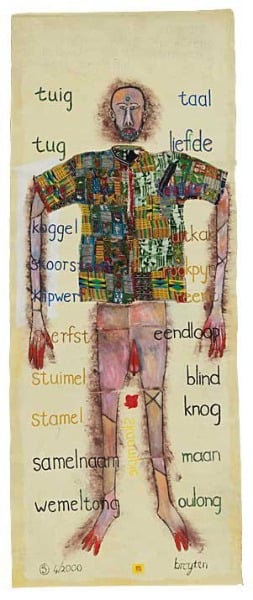
Photo @ Breytenbach Conference, Ghent Centre for Afrikaans and the Study of South Africa, Ghent University, 17–18 October 2019. Translation panel: Jerzy Koch, Breyten Breytenbach, Yves T’Sjoen, Georges Lory and Louise Viljoen.
In December 2026, the Ghent Centre for Afrikaans and the Study of South Africa will host an international symposium on the literary and artistic legacy of Breyten Breytenbach.
For many years Breytenbach used to have a special connection to Ghent, as can be seen from this excerpt, which I have translated from “Breyten schrijven” [Breyten’s Writings] on Voertaal, specifically from the four-part final interview with Breyten Breytenbach at the South African Centre for the Netherlands and Flanders, Pinelands-Cape Town, 19 March 2022.

Image: “boekdoek” by Breyten Breytenbach, Raakruimtes, Hengelo, 2009
Breyten: There is a kind of world citizenship that matters, the so-called Middle World, the so-called nomadic world. It’s people who recognize one another and who walk part of the road together, even if they lose each other along the way, as in the case of Eddy van Vliet. And even if people die too soon. And even if I still weep now for Jan Rabie, for example, who passed away too early, or someone like Ingrid Jonker. And a whole number of others. I think of Neville Alexander, for example, or Willie Kgositsile. Or I think of Mazisi Kunene.
I think of the fact that, at one stage, I legally had an Algerian passport. That’s no longer conceivable today. Nowadays if you were to do that, you’d immediately be locked up in Guantánamo, you know. If not in Russia. In other words, we are experiencing a new constriction, a new closing down of possibilities, and once again, I believe, younger writers and younger poets and younger troublemakers and younger Middle World-people must rise up and start fighting to open that path. If you don’t keep opening it up, it will close. We boere know about channeling water: if you don’t dig open that furrow, then it will silt up. And it is silting up. So, in other words, I think the possibility, in some way, of, let’s say, the [archival] things ending up in Ghent – it won’t be so much that it is Ghent itself for me, or even that it ends up with Yves T’Sjoen, or even in Belgium. But for me it is a coming home, to an outpost of the Middle World.
Yves: Exactly. And you know that your work, your archive, is in safe hands. That it is being optimally preserved.
That there will always be incentives to study it, so that it is open to everyone – wherever he or she may be – to explore it, to write about it. And I now also offer this publicly. The university will gladly continue to support you in that respect, also regarding your work.
Breyten: So I am being recorded here. This is a formal confirmation. Thank you, Yves. But if I can support you in turn, remember, it will always be with great willingness.
Yves: That is what is so important – that the conversation continues between people, that we keep exchanging ideas with one another. Everyone. That you have an open spirit, that you don’t allow yourself to be constrained by a straitjacket, that you try to be open-minded. All this is so important in order to keep the conversation going between people — in all openness, in all serenity, in all integrity.
References
Breyten schrijven #4: Het laatste interview. "Opleidingskursusse in ondergrondse tegnieke."
Breyten schrijven #5: Het laatste interview. "Hugo Claus was veel meer van ’n wêreldfiguur."

